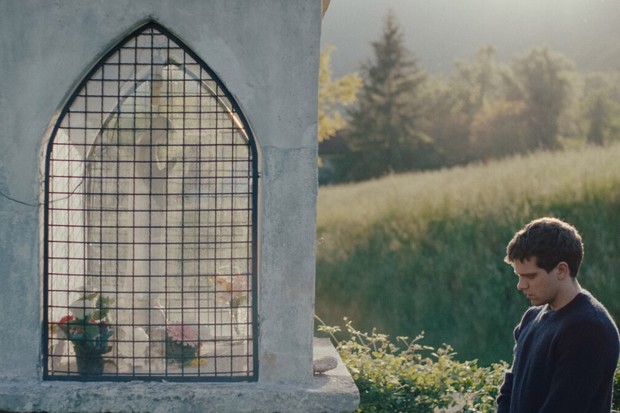Review: Where the Wind Blows
- Marco Righi debates theological issues in his second fiction feature, but there is such a thing as too much subtlety

There are two characters named Lazarus in the Holy Bible. One, the better known of the two, Lazarus of Bethany, the brother of Mary and Martha, was resurrected by Jesus Christ four days after his death. The other Lazarus is a beggar from one of the cautionary tales from the Gospel of Luke, who, after suffering injustice at the hands of the rich during his earthly life, gets satisfaction in the Kingdom of Heaven, while his tormentors get sent to Hell. The latter individual gets a Bible passage about him read directly to screen in Marco Righi’s second fiction feature, Where the Wind Blows [+see also:
trailer
interview: Marco Righi
film profile], which is vying for the Crystal Globe at Karlovy Vary.
So, Righi’s film has a lot to do with the Bible, which it often quotes from the title on, and one might have to join some religious study group just to pick up on all of the references. It tells the story of Antimo (Jacopo Olmo Antinori, glimpsed in Rainbow – A Private Affair [+see also:
film review
trailer
interview: Paolo Taviani
film profile]), a young man who accepts his daily routine of household chores, working on his father’s farm, and Mass and confession at the local church in a village in the Apennines. There is no deeper understanding between him and his younger sister Marta (Yile Lara Vianello, the child star of Alice Rohrwacher’s Corpo Celeste [+see also:
film review
trailer
interview: Alice Rohrwacher
film profile]), and no deeper affection between him and his girlfriend Miriam (Gaja Masciale). One day, he meets Lazzaro (Fiorenzo Mattu), an illiterate worker at the neighbouring farm who has spent all of his life in pain and poverty. The encounter and the friendship between the two reignite the spark for the religious work Antimo used to do before, but which got left by the wayside somewhere along the way. However, his teachings differ greatly from those one might find at a service or in Sunday school. Is Antimo a heretic or the second coming of the Saviour himself?
Righi knows how to envision and execute simple scenes in an effective way, how to use David Becheri’s natural- and analogue-looking cinematography to set the mood, and how to utilise Luca Giovanardi’s music, varying from gentle piano to pulsating electronica, with lots of synth in between, to highlight the emotion. Together with Roberto Rabitti, Righi also keeps the editing under control, keeping the pace meditative, which suits the film’s topics, while the cast members play their characters in a nicely subdued manner.
However, there is such a thing as too much subtlety, and Where the Wind Blows clearly suffers from it, ending up being so ambiguous that it actually seems completely ethereal. On the way, we get some bits and pieces of Antimo’s background (he is a seminary dropout, for undisclosed reasons, but it is safe to assume that his faith was purer than the Church could tolerate), and insights into the questions that trouble him (whether his mother is in Heaven, since she hid her illness, rejected medical treatment and even stopped praying before her death, which all points to an involuntary suicide, of sorts), but it is still hard to draw a concrete conclusion, or even to answer the question of what the film is about. Sure, the whole slow-paced affair is less about specific actions, and more about the character and the philosophical questions he is grappling with, but it still seems like the filmmaker’s own theological musings converted into a small, arthouse film.
Where the Wind Blows is an Italian production by Obiettivo Cinema. TVCO handles the international sales.
Did you enjoy reading this article? Please subscribe to our newsletter to receive more stories like this directly in your inbox.



















